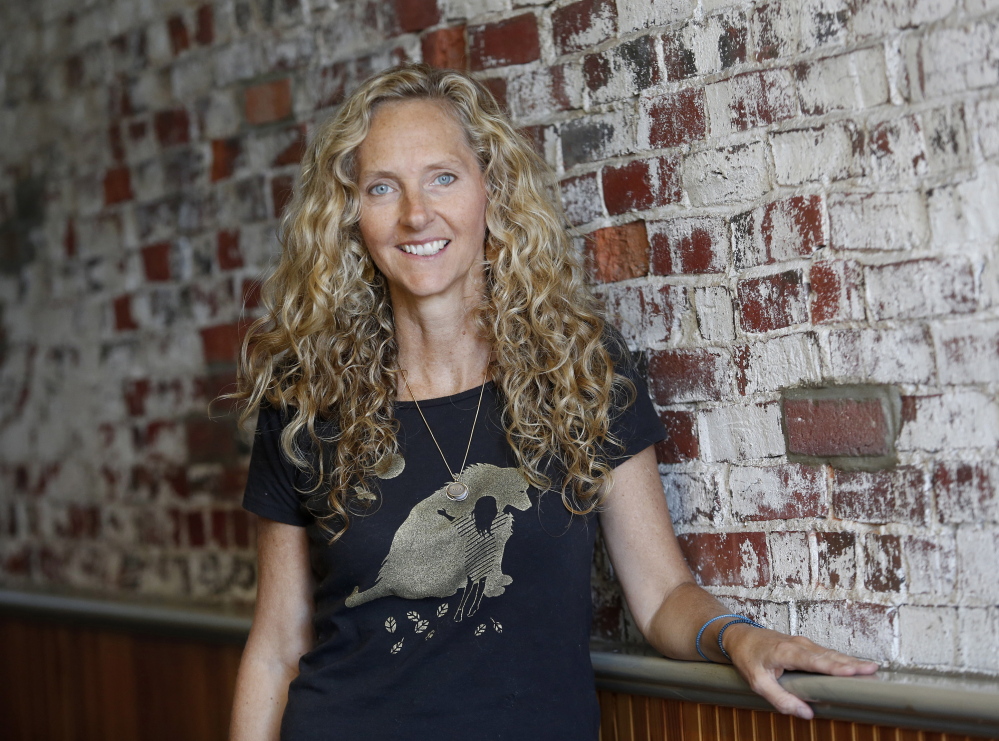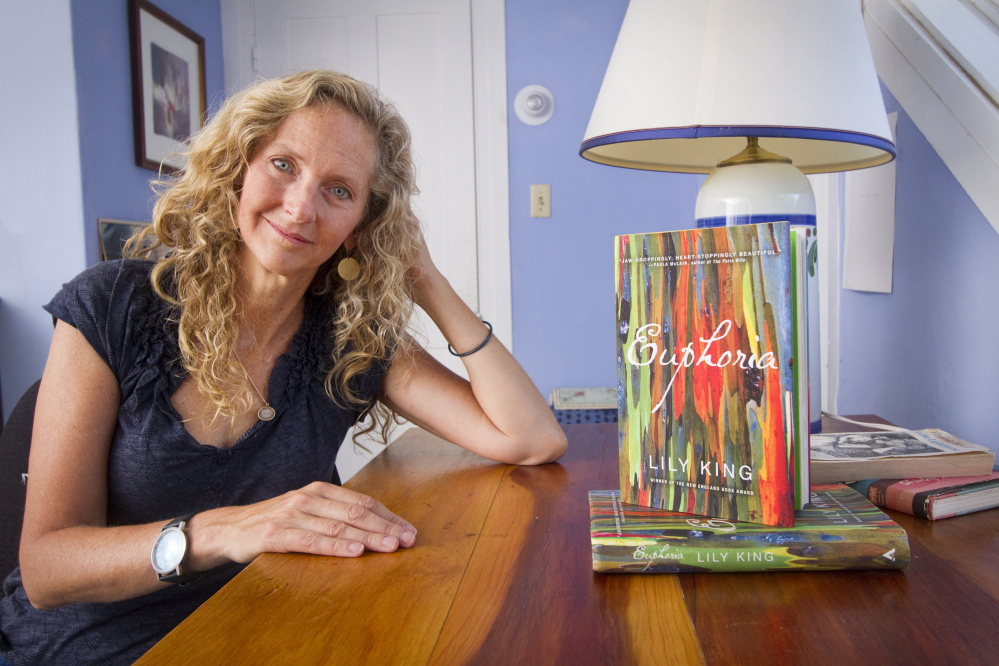YARMOUTH — Lily King knows she has a Maine book in her.
“Oh, I have an idea,” the best-selling novelist said coyly, divulging no secrets.
King has embraced Maine fully since moving here in 2002 and now stands as one of the state’s most successful writers.
Her latest book, “Euphoria,” based on the life of anthropologist Margaret Mead, was one of the summer’s hottest reads, and movie director Michael Apted is adapting it for a big-screen retelling. It won the New England Book Award for fiction and is one of six finalists for the $50,000 Kirkus Prize, a new literary prize and one of the richest.
Maine writers have made a strong showing for the noteworthy prize. Bill Roorbach is also a finalist for his new novel, “The Remedy for Love.” Both will attend the awards ceremony Thursday night in Austin, Texas.
Though King has written in every place she has lived – and there have been many stops along the way – Maine serves as a touchstone for the 51-year-old writer, a spiritual and emotional landing spot in a chaotic life. In Maine, she found an agreeable rhythm to the seasons, allowing a comfortable and productive routine to pursue her creativity.
Maine also provides a safe haven for her and her husband, Tyler, to raise their daughters.
Their move to Maine 12 years ago was motivated by a desire to provide their girls with a stable home environment, which was something King did not have growing up on the North Shore of Massachusetts.
“My family was really broken,” King said. Her parents split when she was 10, her mother whisking her away while her father was at work. “My father married twice again, my mother married once again. I was constantly changing households and changing families.”
She alluded to her fractured home life in her previous novel, “Father of the Rain,” which told of a complex father-daughter relationship.
Writing provided an outlet for her emotions and “a place that I could go where I could control things,” she said. “I could find a part of myself, my own self, that was not influenced by the sort of chaos going on outside.”
Writing, she said, “allowed me to control my own little universe.”
Maine provides something similar.
She and her husband were living in Cambridge, Massachusetts, and agreed they wanted to raise their kids, then 1 and 3, in a quieter setting. King knew Maine from summers spent on North Haven island and vowed to get back here someday.
She didn’t know when, and she didn’t know how.
“I thought I would be in Cambridge forever, and then I realized we really needed open space and easy access to the ocean and trees and nature. I could not imagine raising city kids, really,” she said.
She called a friend who lived in Portland and asked, “If you were to live anywhere other than Portland, where would you live?”
The friend suggested Yarmouth, and a few months later King and her husband closed on an 1848 home in the heart of town, close enough that King could walk for a cup of coffee. She had always imagined living in an old white clapboard home with black shutters, on a quiet street in a small New England community, a vision she attributes to “some weird Puritan New England idea.”
“It seemed sort of distinctive in a way,” King said.
She got all of that in Yarmouth, and then some. She loves the old house but not the constant upkeep. This summer, a simple project to replace the floorboards of the porch turned into rotted wood in the foundation of the barn and a daily swarm of men with power tools, pickup trucks and backhoes.
Still, she has no regrets. The kids, now 13 and 15, attend the Waynflete School in Portland and love living in Yarmouth. Even if she and her husband wanted to move, King said, her daughters would never let them.
She feels settled. Forever.
Here, she found a footing for her writing life, too. When she came to Maine, King had a solid if unspectacular writing career. She was trying to establish her place in a crowded field.
Her first novel, “The Pleasing Hour,” was published in 1999, before she moved to Maine, and earned good reviews. In 2005, “The English Teacher” did better. It won the Maine Book Award for fiction and was named Book of the Year by the Chicago Tribune, and Publisher’s Weekly put it among the top 10 best novels of the year.
But it was “Father of the Rain,” published in 2010, that established King’s reputation as one of the country’s most sensitive and perceptive new voices. It told of family drama in a well-hewn New England community and the pull of family. It won the New England Book Award for fiction and a Maine Literary Award, and was named a summer must-read by O, the Oprah magazine.
“Father of the Rain” is a novel, but King’s high school English teacher, Tony Paulus, recognized the biographical nature of the story. He understood he was reading about her relationship with her father, with whom Paulus worked at Pingree School in South Hamilton, Massachusetts.
“She hit that story so right on. There was absolutely no question what it was about,” Paulus said. “It was the perfect time in her career to write that story.”
He taught King in 11th and 12th grades, in creative writing.
King recalls it as a grueling class. Paulus required three pages of polished prose every Monday morning. It was there she discovered her inner voice, thanks largely to the prodding of Paulus to write from experience. It allowed her to go deep with her emotions.
King was a good student but not a great student, Paulus recalled. “She was shockingly in the middle of the group,” he said. “She was not a top writer then.”
But she is by far the most accomplished of all his former students, he said.
He appreciates the “understated subtlety” of her writing and has enjoyed witnessing the evolution of her voice from one book to the next. He called her a courageous writer “who is prepared to tackle some tough issues.”
Paulus read “Euphoria” this summer and found himself caught up in the texture of the story about anthropologists traveling in a remote region, and the love triangle that ensues. He plans to read it a second time to focus on the writing itself.
“I just love her voice,” he said. “She is becoming more and more sophisticated, and simpler and simpler at the same time. It’s fascinating to witness her development.”
King writes at home in Yarmouth, although she and her husband recently leased an apartment in Portland near Waynflete, to lessen the inconvenience of multiple commutes each school day. The Portland apartment may become her writing studio during the day while the kids are in school.
She writes first drafts by hand, committing her prose to paper. Later, she puts it in the computer, rewriting, refining and editing during that process.
“Euphoria” has opened a new world. In addition to being her most popular book, it also represents a new kind of novel for King. Following her teacher’s advice, she always wrote from experience and knowledge – until “Euphoria.”
She knew little about Margaret Mead and next to nothing about anthropology. On a trip to a used book store in Portland, she picked up a Mead biography. The subject interested her, and she began reading more about Mead.
King set her book in New Guinea in 1933. Her narrator is a man, and an Englishman at that.
“Euphoria” is a love story, and the lovers happen to be anthropologists. King learned the science and the language of anthropology so she could tell a believable love story.
“It was just so challenging on so many levels,” she said. “I am still in shock that my editor liked it enough to publish it and that people have responded to it the way they have. I wrote it and felt I was so completely out of my element. I didn’t say to myself, ‘I am taking a big risk here.’ It just felt so ridiculous that I was writing this book, because I did not think I could do it, but I was so attracted to the story I could not stop myself from doing it.”
That so many people have responded to it, critics and readers alike, has emboldened her to feel more confident in her storytelling. Now, instead of shying away from a story that might feel distant, she’s more inclined to reach for it.
“Now I feel that, when I get an idea, I won’t stop myself from trying,” she said.
Josh Christie, manager of Sherman’s Books and Stationery in Portland, said King has made fans of local booksellers because she’s an agreeable writer to work with. When Sherman’s opened in the Old Port this spring, King stopped in with a gift of a lily to welcome the bookseller to town.
The opening of the store coincided with the publication of “Euphoria,” and King invited the Sherman’s staff to her house for a party she was hosting to celebrate the launch of the book.
She spoke at Sherman’s to promote “Euphoria” this fall. It was in a small room, and King connected with the dozen or so people who showed up. She read a few pages and casually answered questions as though she were chatting among friends.
Nothing was off limits. She talked about how she got the idea for the book, what she thinks of the cover art – she likes it – and about her writing practice. She’s not an author who disciplines herself to write 10 pages a day, she told one questioner.
Writers who do that “don’t have children,” she said with a laugh. “I just try to show up and be there. If it happens, it happens.”
“She’s a very empathetic and a very real person,” Christie said after the reading.
King’s community involvement extends to The Telling Room, a writing center in Portland that focuses on helping young writers develop their storytelling. Aware of the importance of writing in her life when she was young, King mentors kids on writing and developing the confidence to express themselves.
“It’s been such an important resource for people who have immigrated to this country from war-torn places,” she said. “These kids hold these stories that are heartbreaking and devastating, and they get to tell them in this safe place. It’s a true place of healing. I always say writing saved my life, and I think it’s saving lives every day.”
With her Kirkus nomination pending, a paperback version of “Euphoria” due in the spring and a movie to follow, King continues to promote her book, although the pace has slowed since the summer.
She won’t say much about it, but she’s begun early work on her next book. She has written several pages of notes and a few pages of prose.
Winter is good for writing, she said.
“I love drinking tea and putting on a couple of sweaters and sitting at my desk and not feeling like I am missing anything by not being outside,” she said.
As she spoke, King fingered a chain on her neck that includes small metal tags with the names of her husband, her kids and herself. The necklace came as a gift 11 years ago. She wears it every day – her family, once fleeting and fractured, now secure and settled.
Send questions/comments to the editors.





Comments are no longer available on this story